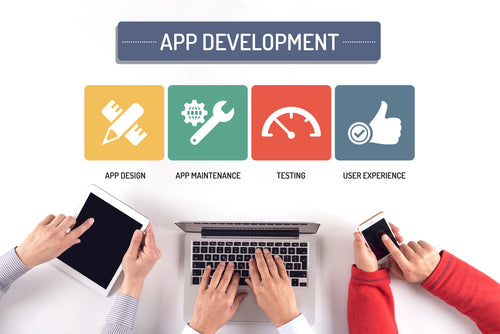Mobile App Development for SMBs

Mobile App Development for SMBs
Extend your Business
Our mobile applications, also known as apps, are designed to maximize impact and attract new customers for your business and retain current ones.
In the world, more than 70% of consumers today prefer to use a mobile application instead of a website. Also, today having an app allows you to offer your services and sell your products 24 hours a day.
Cell phones are very advanced lately and are starting to become an essential part of several companies. This can range from transport, retail, health, marketing, manufacturing, education, and many more sectors. It is, therefore, not surprising that various industries are increasingly dependent on this continually evolving innovation.
Mobile apps are, consequently preferred by most industry leaders. The goal of developing a mobile app for small businesses is to increase reach while allowing more user interaction. The most effective and easy way to reach your company's audience is through mobile apps. Smartphones play an essential role in acquiring customers and to be able to get in touch with them.
Obviously, there are a few focuses to remember as an application designer when building up an application for independent ventures. In this article, we will clarify some of them.
- Choice of platform
The basic idea behind developing a mobile app is to reach a larger audience. The mobile app platform you choose plays a vital role in this. Before making a choice, you should pay close attention to many factors. Look at: the demographics, age group, the purchasing power of the users, the type of business you have, and much more.
An important choice you have to make is to determine on how many platforms you want to launch the app. Of course, it is always better to start first with a single platform, and from there, you can more easily expand on other platforms. When determining the platform that best suits your mobile app for a small business, consider: app features, app brand, audience, and pricing strategy. Once you have this sorted out, you need to choose a development methodology for the business app. Are you going for Native, Hybrid, or Web? Native apps have many advantages, but the costs are considerably higher.
- Native or Hybrid apps
Native apps are mobile apps developed for a particular mobile operating system. In the case of iOS, Swift is used as the programming language, and in Android, Java is used. Since Native apps are developed for a specific platform, they can use all the functions that this platform has to offer. This is possible because these native apps can use the particular software and hardware of the platform and the mobile devices.
Hybrid apps, on the other hand, are a combination of both native and web apps. It is a particular app in which the same app is developed for different operating systems such as iOS and Android.
- The backend
Choosing a backend is another choice that must be made before developing your mobile app for a small business. Most mobile apps use APIs for this. Keep in mind that not all apps you create need a custom backend. Many apps are easily accessible through APIs to mobile devices. These mobile applications can easily be handled using a local database. These apps don't even require backend support. From the developer's perspective, you need to determine what the requirements are for the backend. Keep in mind what it costs and how much time it takes to set up a backend to make the right choice.
- UI / UX design of the mobile app
If you skip this aspect of mobile app development, your app is bound to fail. UI / UX plays an essential role in the mobile app world. It 'sIt's so vital that it's a factor that determines the future of your app. You have to understand the difference between UI and UX. UI is the interface structure, and UX is the client experience. If you have a useful UI for your app with a bad UX, then the app is doomed to fail.
The client experience plays a critical component with regards to the computerized scene. An app defines how a user thinks and feels about a particular service from a company. What is central is to develop something that has value, is easy to use, and is useful for your target audience. Above all, make sure that the app does not become complicated and confusing.
An app that has been well thought out offers a seamless user experience, allowing for significant benefits to be achieved. The functionality and content displayed must match the audience. As a result, the end product will provide a much better user experience and service to the user.
- The target audience of the mobile app
Identifying the end-users of your app is very important. During the development of the app, this target group must be continuously taken into account. Look carefully at the following factors. The country, purchasing power of the user, occupation, interests, age group, and gender. These are factors that you must consider in the development of your app. For example, if you develop a retail app, you have to show more visuals than written content. This ensures that your audience feels more connected to the app. If you meet the expectations of the users, your app will undoubtedly become popular and generate more income.
Conclusion
There are billions of smartphone users, and this number keeps growing many people spend a lot of time on mobile apps and use them in large part for buying items, booking tickets, and payment purposes.
No matter what industry, mobile apps are starting to become an essential tool for small business growth. The odds are relatively high, and the market potential is enormous. When you're ready to develop a mobile app for a small business, pay special attention to these points to make your app a great success.
Mobile applications are necessary for the universe of tools to reach the end customer. Conventional media have lagged, with mobile apps becoming the new mass communication channel.




